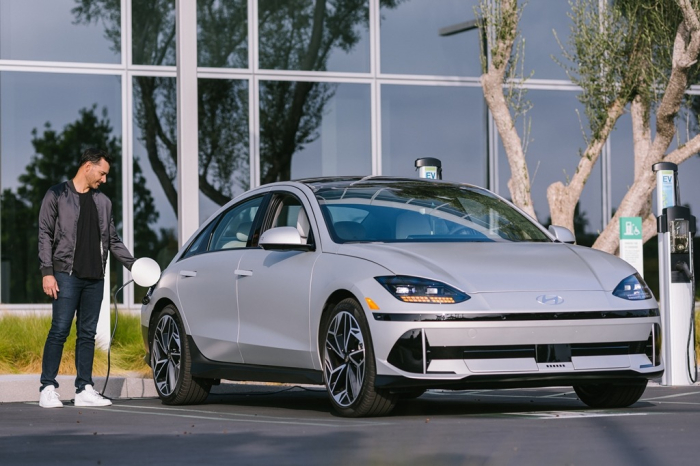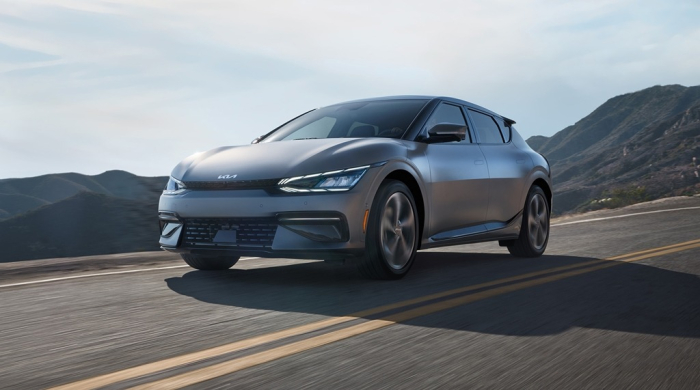Hyundai, Kia offer up to $7,500 discounts for EVs in US
The price war in the global EV sector is expected to intensify; Volkswagen, Tesla slash EV prices
By Jan 14, 2024 (Gmt+09:00)
LG Chem to sell water filter business to Glenwood PE for $692 million


KT&G eyes overseas M&A after rejecting activist fund's offer


Kyobo Life poised to buy Japan’s SBI Group-owned savings bank


StockX in merger talks with Naver’s online reseller Kream


Meritz backs half of ex-manager’s $210 mn hedge fund



Hyundai Motor Group., the No. 2 electric vehicle brand in the US, is offering discounts of up to $7,500 for their EVs in the country — the maximum federal benefit for clean vehicle consumers — as it aims to enlarge its market share amid falling demand in the world’s second-largest clean car market.
Hyundai Motor Co. is providing cash offers of $7,500 to buyers of 2024 versions of its IONIQ 5, IONIQ 6 and Kona Electric in the US until the end of January, according to Hyundai Motor America’s website.
The incentive brings down the manufacturer’s suggested retail price (MSRP) of the IONIQ 6 SE, its most affordable trim, to $34,950. That's cheaper than the Tesla Model 3 Highland with a price tag of as low as $35,990, according to industry sources. The incentive lowers the price of the Kona Electric to as low as $25,175.
The US unit of Hyundai affiliate Kia Corp., meanwhile, has been providing cash incentives of up to $7,500 to buyers of its EV 6 and Niro EV. Kia America Inc. is providing a $7,500 cash incentive to buyers of its 2023 EV6, and $5,000 to buyers of the 2024 version of the electric mid-size crossover SUV. The incentive program started Jan. 3 and will end on March 4.
“Hyundai and Kia, which are not eligible for the IRA, are offering the same benefits as the federal subsidies,” said a US car dealer, referring to the Inflation Reduction Act that included measures to boost the country’s EV and related industries. Hyundai and Kia have not benefited from the policy as they are not manufacturing EVs in the US.
Despite this, Hyundai and Kia sold a combined 94,000 EVs in the US last year, becoming the No. 2 seller of clean vehicles there. The top EV maker was Tesla Inc., which sold about 655,000 units.
This comes as Hyundai and Kia aggressively court drivers with price cuts. Hyundai rolled out the 2024 IONIQ 6 with a lower price tag than the 2023 models of the company’s first fully electrified sedan. Kia offered discounts for leased EV6s.
IMMEDIATE CASH INSTEAD OF TAX CREDITS
“The price competitiveness of EVs has become more important as the IRA subsidies, which had previously been provided as tax credits, are available in cash at the time of purchase starting this year,” the dealer said.
The US has been providing EV buyers with benefits of up to $7,500 per vehicle that's assembled in North America. As of Jan. 1, Washington allows consumers to request the money when buying an EV instead of waiting until they file their taxes to collect the credit.

The government, however, raised the bar for the benefit by detailing new battery sourcing requirements, which caused some EV makers such as General Motors Co. to lose eligibility.
GM has told its dealers it would provide the equivalent EV tax credit purchase amount for any vehicle that became ineligible due to the government’s new battery sourcing guidelines.
CUTTHROAT PRICE WAR
The global price war in the EV sector is expected to intensify as automakers struggle to revive slowing demand amid smaller government incentives and sluggish economic growth, industry sources say.
Volkswagen AG, which had refused to join the price war, last week slashed prices on its ID line of EVs in Europe by up to 30% following Tesla’s price cuts on its top-selling Model 3 and Model Y.
The US EV maker on Friday lowered the prices of those models in China again.
Global EV makers are under growing pressure to slash prices as global economic conditions remain uncertain, hurting demand for clean vehicles, according to financial information and news provider Bloomberg. Only three of the world’s ten largest automakers met their sales targets, it said.
Write to Nan-Sae Bin at binthere@hankyung.com
Jongwoo Cheon edited this article.
-
 Electric vehiclesHyundai bets big on deep discounts to survive EV plateau
Electric vehiclesHyundai bets big on deep discounts to survive EV plateauOct 31, 2023 (Gmt+09:00)
2 Min read -
 Electric vehiclesKia unveils low-cost EV models to reboot sales growth
Electric vehiclesKia unveils low-cost EV models to reboot sales growthOct 12, 2023 (Gmt+09:00)
4 Min read -
 Electric vehiclesCarmakers in race for low-cost EVs amid tepid sales growth
Electric vehiclesCarmakers in race for low-cost EVs amid tepid sales growthAug 08, 2023 (Gmt+09:00)
2 Min read -
 Electric vehiclesKorea tops US eco-friendly car import rankings despite IRA disadvantage
Electric vehiclesKorea tops US eco-friendly car import rankings despite IRA disadvantageJul 10, 2023 (Gmt+09:00)
2 Min read -
 AutomobilesKia offers up to $7,500 in incentives in US for leasing EV6
AutomobilesKia offers up to $7,500 in incentives in US for leasing EV6May 17, 2023 (Gmt+09:00)
1 Min read


